Experiment on separate waste collection fails in Kazan and another one begins
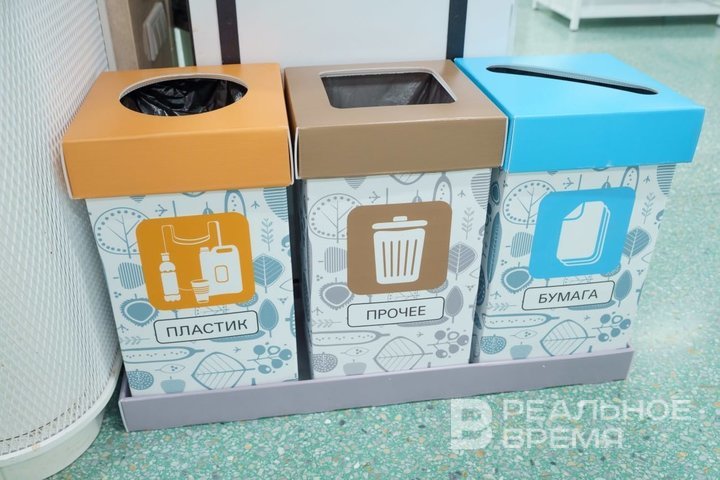
Kazan acknowledges that an attempt to introduce separate waste collection in Tatarstan failed. Officials note the dishonesty of residents — in tanks specially designated for different wastes, “there are mixed waste, not sorted.” Realnoe Vremya tried to find out how the problems of sorting and recycling of solid waste are being solved today, how much garbage goes to waste, and how much goes to income, and who earns from it.
The Responsible Little Prince
Kazan residents were not affected by the excellent comics based on The Little Prince by Exupery, posted on the telegram channel of the city hall for educational purposes. In the story, the Little Prince tells the Fox about where to put the garbage collected during the cleaning of the planet, teaches him the principles of separate collection of solid waste and explains what can be obtained from waste after recycling. In response, the townspeople were outraged that there were either no containers for separate collection at container sites in the yards, or the contents of containers with different inscriptions for export were dumped into one garbage truck.
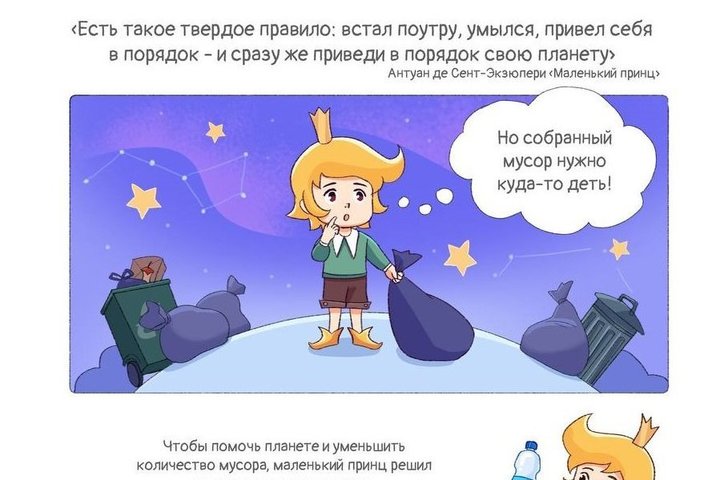
“According to the regional operator, in 2018 there was an attempt to introduce separate waste collection using green tanks, on which signs were placed about the reception of a separate category of waste," the mayor's office answered them and hinted that the attempt failed due to the dishonesty of citizens .“Such a system did not take root, since mixed waste got into the tanks, not sorted. The stickers on the tanks remained, but now all the containers are used to collect solid municipal waste. Yellow grids are installed for storing recyclable waste. Currently, all yellow grids are equipped with information sheets on what waste can be stored in them.
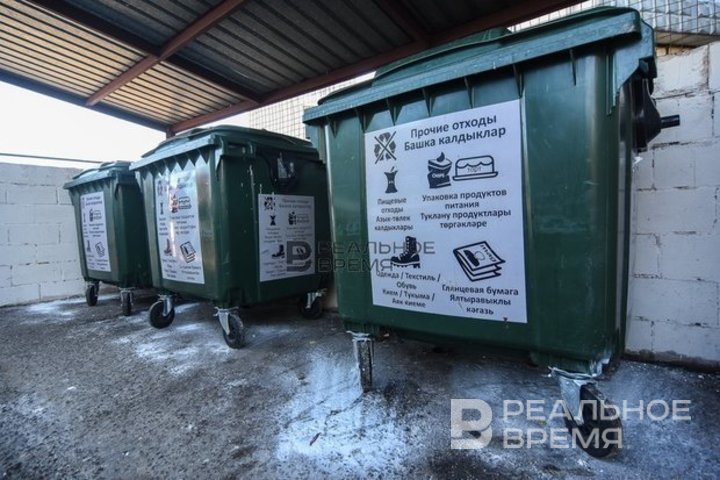
However, stickers with inscriptions on green plastic containers have remained in many places and for the sixth year they have been misleading the townspeople, and disciplined citizens habitually put only plastic into yellow metal grids. Campaigning works: people, caring about the environment, for the most part have developed the habit of sorting garbage. This follows from a large number of requests from Kazan residents to the city authorities to hurry up with information signs on yellow grids.
Kazan residents advocate for the paid collection of sorted waste
“About 70% of recyclable materials from yellow grids are recycled today," the press service of the regional operator PZhKH told Realnoe Vremya. “But of what gets into green containers and then sorted at the waste sorting station on Vasilchenko Street, only 10-12% is spent on recycling. The difference is serious, so we appeal to all citizens with a request to carry out primary waste sorting.
Now, according to the regional operator for the treatment of MSW in the Western zone of Tatarstan, 1,733 yellow grids have been installed at container sites in Kazan, and 2,020 in the republic as a whole (except for the capital, there are grids in Zelenodolsk district — in Osinovo, and in Vysokogorsky). They are designed to collect sorted waste, and not only plastic can be thrown into them, but also metal waste, glass of all kinds, waste paper, and “tetrapak” type packaging. By the end of 2024, their number is planned to be increased by 1,200 units.
Kazan residents are convinced that it would be possible to increase the efficiency of solid waste sorting by introducing a paid collection of sorted waste. “In Sweden, there are devices at the shops, you put a tin can — you get a penny in return, you go to the store, add to your purchases," a resident of the city wrote to the mayor's office. To which the officials replied: “Such fandomats were installed on trial in 20 schools, there were plans to install them in some shopping centres. As far as we understand, the peculiarity where they are installed in retail chains of other countries is that the cost of packaging is usually included in the price of the goods, that is, the price is immediately higher and it is possible to return part of the cost of the goods by returning the container. But we believe that fandomats alone will not solve the problem of a huge amount of garbage.”
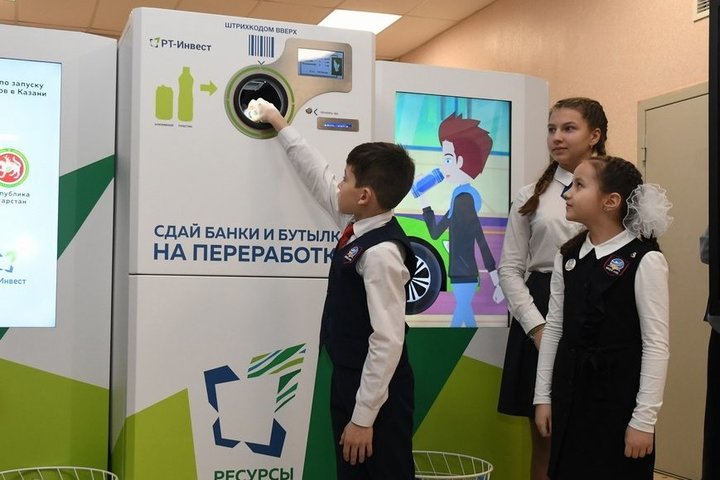
“The cost of the product includes all costs, including raw materials, production, packaging and logistics," says Sergey Nikiforov, a Kazan entrepreneur, Honoured Economist of Russia and Tatarstan. “But if they return the packaging in the form of waste paper, recyclables, which we will have to hand over, then this will be unnecessary trouble for us, enterprises are not interested in this. Besides, when it comes to products packaged in ordinary consumer packaging — boxes, bags, then how to return such containers to the manufacturer when the products scattered all over the country? It is even theoretically impossible to imagine.
At the end of January 2020, a pilot project with the installation of fandomats for collecting plastic and aluminum was launched in 20 Kazan schools, where about 25 thousand children were studying at that time. The Pilot was presented in the presence of Sergey Chemezov, CEO of Rostec Group, Rustam Minnikhanov, the rais of the republic, and Ilsur Metshin, the mayor of Kazan.
Sorting progress
This week, at a meeting in the executive committee of Kazan, Yevgeny Chekashov, CEO of PZhKH management company, gave a speech. The head of the regional operator company said that since mid-September last year, the MPS-1 waste sorting station on Vasilchenko Street, which remains the only waste sorting enterprise in the city, has increased the processing of MSW from 120 to 240 tons per day and processes an average of about 20 tons of recyclables daily.

“About 1,600 tons of waste are removed from Kazan alone every day," he recalled. “Working with the population, we increase the quality of primary sorting. Thanks to responsible residents and the work of MPS-1, 2,136 tons of waste did not enter the landfill in the first half of 2024 — this is 36 wagons of a freight train, or 600 garbage trucks.
According to Chekashov, the weekly export of recyclables today is 1,500 cubic metres — 6.5 times more than in the same period last year (230 cubic metres). He explained the increase in sorting volumes by expanding the infrastructure for separate collection, a wide information campaign in the media and an increase in public awareness.
Popular Collection Point
There is a Collection Point at Vasilchenko, 6 — a recycling collection point, where 39 waste fractions are accepted. The volume of garbage collection is growing here: in January, citizens handed over more than 2 tons of raw materials, and in May — almost 5.3 tons.
“We intend to scale the experience of the Collection Point to all districts of Kazan and open similar points," Chekashov said, and then reported on two more seasonal actions. “After the New Year holidays, about 2,500 Christmas trees did not get to the landfill, but were recycled into chips. Collecting tires in the off-season turned out to be extremely in demand. If in autumn we collected 600 cubic metres of used rubber from 10 containers installed in almost all districts of the city, then this spring the collection has almost doubled: 1,040 cubic metres. All rubber is recycled.
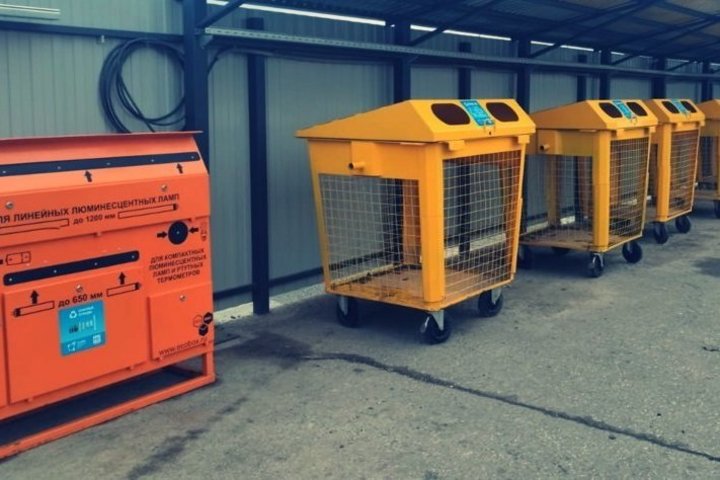
The number of visitors who bring sorted waste has almost tripled: in January 2024 there were 146 of them, in May it was already about 400.
Selfless sorting begins with kindergarten
Since April, a regional operator station has operated in the children's city of professions, where preschool children and primary school students learn how to properly sort waste and find out what things can be produced from recycled materials. The experiment is also underway in the Sovetsky district, where students of the gymnasiums No. 175, No. 184 and lyceum No. 185 collected 400 kg of recyclable materials — this practice is planned to be extended to the whole city.
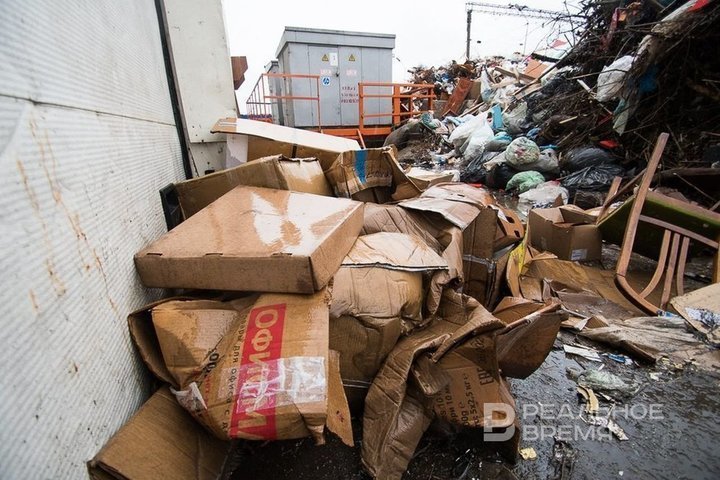
However, the regional operator did not report any material bonuses for the delivery of recyclables, which could make the sorting process attractive to citizens. There are no fandomats at the Collection Point that would pay the cost of recycled materials. Schoolchildren are also engaged in collecting waste on pure enthusiasm. Although there are private reception points for plastic, waste paper, glass containers, and radio components in Kazan. Citizens can get from 4 to 35 rubles per kilogram there, depending on the type of waste deposited — so at least there is a chance to earn gasoline for garbage delivery to the collection station.